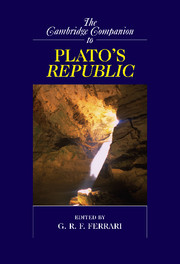Book contents
- Frontmatter
- 1 The Protreptic Rhetoric of the Republic
- 2 The Place of the Republic in Plato’s Political Thought
- 3 Rewriting the Poets in Plato’s Characters
- 4 Wise Guys and Smart Alecks in Republic 1 and 2
- 5 Justice and Virtue: The Republic’s Inquiry into Proper Difference
- 6 The Noble Lie
- 7 The Three-Part Soul
- 8 Eros in the Republic
- 9 The Utopian Character of Plato’s Ideal City
- 10 Philosophy, the Forms, and the Art of Ruling
- 11 Sun and Line: The Role of the Good
- 12 Beginning the “Longer Way”
- 13 The City-Soul Analogy
- 14 The Unhappy Tyrant and the Craft of Inner Rule
- 15 What Is Imitative Poetry and Why Is It Bad?
- 16 The Life-and-Death Journey of the Soul: Interpreting the Myth of Er
- Bibliography
- Index of Passages
- Index of Names and Subjects
- Series List
8 - Eros in the Republic
Published online by Cambridge University Press: 28 November 2007
- Frontmatter
- 1 The Protreptic Rhetoric of the Republic
- 2 The Place of the Republic in Plato’s Political Thought
- 3 Rewriting the Poets in Plato’s Characters
- 4 Wise Guys and Smart Alecks in Republic 1 and 2
- 5 Justice and Virtue: The Republic’s Inquiry into Proper Difference
- 6 The Noble Lie
- 7 The Three-Part Soul
- 8 Eros in the Republic
- 9 The Utopian Character of Plato’s Ideal City
- 10 Philosophy, the Forms, and the Art of Ruling
- 11 Sun and Line: The Role of the Good
- 12 Beginning the “Longer Way”
- 13 The City-Soul Analogy
- 14 The Unhappy Tyrant and the Craft of Inner Rule
- 15 What Is Imitative Poetry and Why Is It Bad?
- 16 The Life-and-Death Journey of the Soul: Interpreting the Myth of Er
- Bibliography
- Index of Passages
- Index of Names and Subjects
- Series List
Summary
The Republic repeatedly treats eros as if it were unruly or bad and ought to be remade to be more congenial to good government. The illegality of choosing a mate for oneself, compulsory coed exercising in the nude, the imposition of eugenically determined match making, and the enforced discipline of having many sexual partners but no single partner to call “one's own” are decidedly strange institutions. Such attempts to coerce and mold eros to fit abstract justice imply a negative judgment about the political effects of ordinary erotic desire that is not in harmony with the liberated views about love and sex prevalent in most liberal democracies today. Nor are the coercive and legalistic stances toward sexual unions taken in the Republic and other political dialogues (e.g., Pol. 310bff.) in harmony with certain other dialogues of Plato, namely, the “erotic” dialogues, which literally sing the praises of eros: in the Symposium and Phaedrus, eros is said to lead upward to pure beauty and goodness. In fact, the coercive parts of the Republic are not even in harmony with other parts of the Republic itself, for - just after the erotic regimen has been legally imposed - there follows a disquisition on eros that reads like a Symposium in miniature, with a profligate, promiscuous eros providing humanity's primary mode of access to the Forms.
- Type
- Chapter
- Information
- The Cambridge Companion to Plato's Republic , pp. 202 - 231Publisher: Cambridge University PressPrint publication year: 2007
- 8
- Cited by

